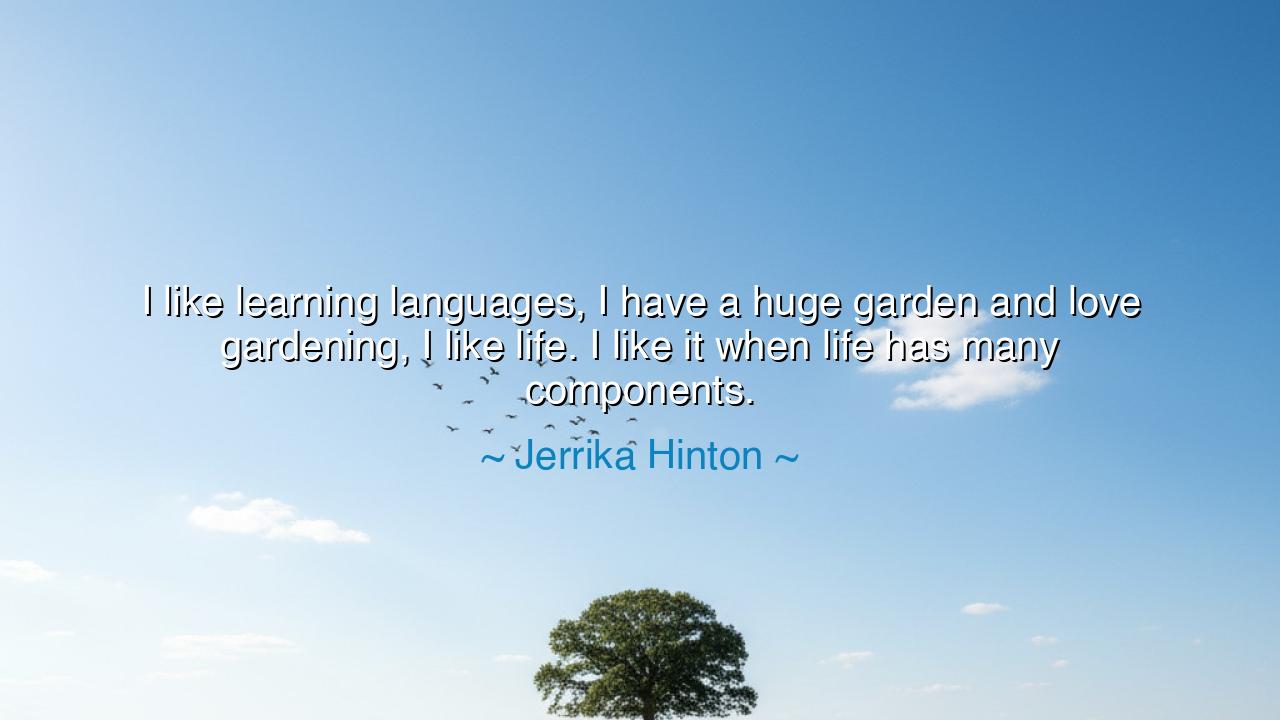
I like learning languages, I have a huge garden and love
I like learning languages, I have a huge garden and love gardening, I like life. I like it when life has many components.






“I like learning languages, I have a huge garden and love gardening, I like life. I like it when life has many components.” Thus spoke Jerrika Hinton, an artist of both heart and mind, whose words carry the fragrance of joy in their simplicity. Yet within this gentle confession lies a wisdom profound and ancient—the celebration of wholeness, of a life rich in diversity, of the soul’s hunger to grow in many directions. She reminds us that the secret of fulfillment does not lie in the pursuit of one single passion alone, but in the harmony of many—each nurturing a different part of the spirit.
The origin of this saying is found not in a philosophical treatise, but in the everyday reflections of a woman who lives with curiosity and gratitude. Jerrika Hinton, known to the world for her artistry in performance, reveals in these words that she is also a student of life itself. To her, languages, gardening, and the simple joy of living are not separate pursuits, but threads in the same tapestry. She recognizes what many forget—that life is not meant to be a narrow path but a vast meadow, rich with experiences, each adding color to the soul’s design.
To “like it when life has many components” is to live as the ancients once counseled—to seek balance, harmony, and fullness of being. The philosopher Aristotle taught that happiness, or eudaimonia, is found not in one pursuit alone, but in the flourishing of all our faculties: the mind through learning, the heart through love, and the body through labor and rest. The wise have always known that life’s beauty is revealed through variety. The musician must sometimes set aside her instrument to tend her garden; the scholar must pause from books to gaze upon the stars. In this rhythm of change and return, the spirit breathes deeply and grows.
Consider the example of Leonardo da Vinci, that titan of the Renaissance. He painted and sculpted, yes, but he also studied anatomy, designed machines, composed music, and pondered the flight of birds. To him, all knowledge was one—each pursuit a pathway to the divine order that unites all things. Like Hinton, Leonardo rejoiced in a life of “many components.” His curiosity made his days an endless adventure; his mind, like a garden, flourished with countless living ideas. And though centuries have passed, his example still whispers to us: the human spirit is not meant for monotony, but for exploration.
In learning languages, we enter the minds of other peoples; we discover new ways of thought and new shades of meaning. In gardening, we touch the earth, that ancient teacher of patience and renewal. And in loving life, we practice gratitude, that highest of virtues which transforms existence into celebration. Each of these acts—though humble—is a form of worship. They draw us nearer to the divine mystery of creation, which itself is composed of countless parts, yet remains one harmonious whole. As the heavens contain both sun and shadow, so too should our lives hold both learning and leisure, labor and delight.
The modern soul, however, often forgets this. Many rush through existence chasing singular goals—success, wealth, recognition—while neglecting the quiet joys that make life whole. They become like a tree with one great branch but shallow roots. Yet Hinton’s words call us back to simplicity, to wholeness. She reminds us that the soul thrives not through intensity alone, but through balance. Life is richest when it contains variety—when we allow ourselves to be both student and gardener, dreamer and doer, artist and friend.
Therefore, my child, remember this wisdom: cultivate a many-colored life. Do not let your days grow dull from repetition or fear of change. Try your hand at new things—learn a new word in another tongue, plant a seed and watch it rise, listen to the music of another culture, or sit quietly and let gratitude fill your chest. Each small act of curiosity or care adds another note to the grand symphony of your existence.
For in the end, it is not the number of years that makes a life great, but the depth and breadth of the moments within it. Jerrika Hinton’s simple joy is, in truth, a profound command: to live fully, to live diversely, to embrace the many components that make up the miracle of being alive. So go forth and build your garden—of knowledge, of kindness, of wonder—and let it bloom in a thousand colors. For the soul that rejoices in the many is the one that understands the beauty of the whole.






AAdministratorAdministrator
Welcome, honored guests. Please leave a comment, we will respond soon